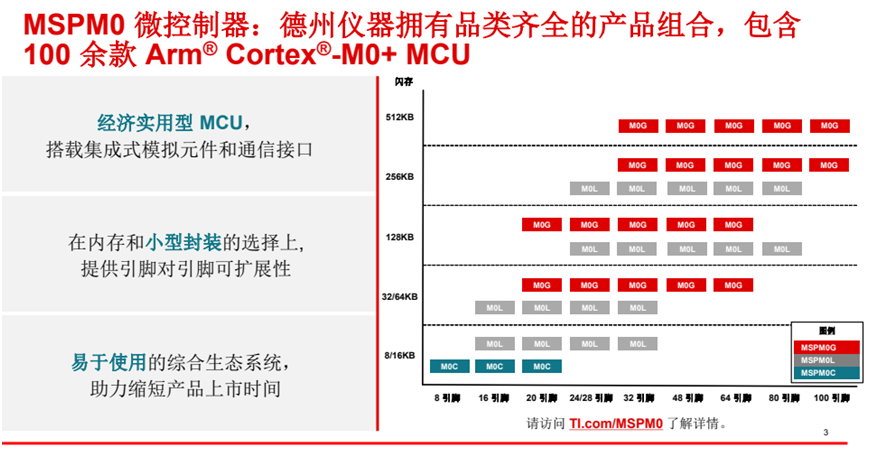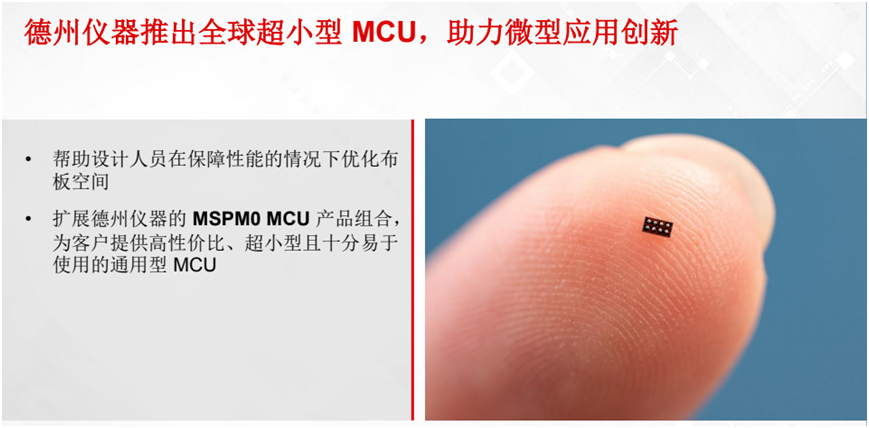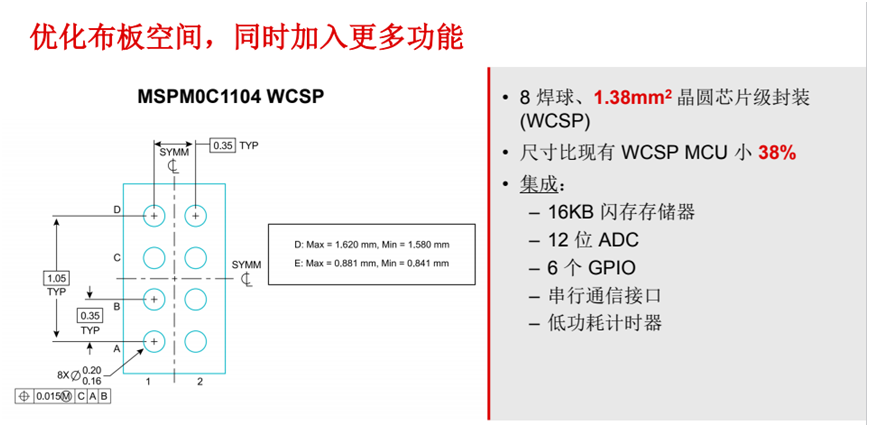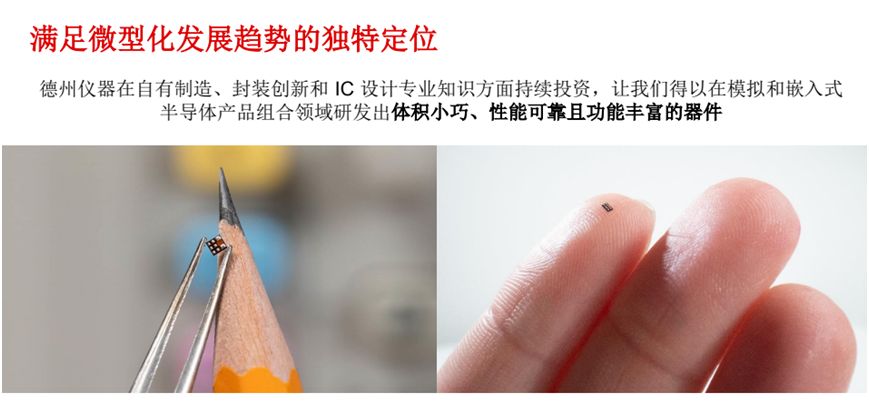
 In the face of intensifying global competition in the microcontroller (MCU) market, Texas Instruments (TI) has made a significant move at the start of the year—launching the new MSPM0C1104 MCU, marking the first shot in MCU innovation for 2025. Its M0 core architecture once again demonstrates robust vitality. This chip, officially defined as “the world’s ultra-small,” breaks through with disruptive packaging technology, reducing its size by 38% compared to similar products while achieving a perfect balance between performance and power consumption.
In the face of intensifying global competition in the microcontroller (MCU) market, Texas Instruments (TI) has made a significant move at the start of the year—launching the new MSPM0C1104 MCU, marking the first shot in MCU innovation for 2025. Its M0 core architecture once again demonstrates robust vitality. This chip, officially defined as “the world’s ultra-small,” breaks through with disruptive packaging technology, reducing its size by 38% compared to similar products while achieving a perfect balance between performance and power consumption.
According to Yiding Luo, product line manager for TI’s MSP microcontrollers, this chip is designed specifically for space-sensitive scenarios such as medical wearables and miniature consumer electronics. It not only continues the low-code development advantages of the MSP series but also significantly reduces board complexity through highly integrated design, shortening design time and injecting critical computing power into the miniaturization revolution of smart terminals.
This move not only expands TI’s territory in the ultra-low-power MCU field but also signals a new round of “space optimization revolution” for IoT edge devices.
01
Empowering Smart Upgrades with Hundreds of Models
The wave of digitalization and intelligence is sweeping through the consumer, industrial, and automotive sectors, bringing new explosive points for cost-effective MCUs. TI has built a golden balance of economy and high performance with over a hundred Arm® Cortex®-M0+ MCU models. Since the launch of the first-generation MSPM0 series two years ago, TI has continuously refined its product line with “precision craftsmanship”—creating versatile solutions that cover the consumer, industrial, and automotive sectors through pin-level compatibility design, modular function combinations, and pay-per-use models.

Yiding Luo stated that TI’s MCUs have now formed three major feature camps: the M0G series, with a luxurious configuration of dual-core ADC + 12-bit DAC, showcases computing power in high-performance scenarios such as motor control; the M0L series integrates operational amplifiers and low-power cores, making it an ideal partner for battery-powered devices like power tools and sensors; the M0C series pushes cost-performance ratios to new heights through streamlined peripherals and process optimization.
This “pyramid-shaped” product strategy meets the cost-sensitive needs of entry-level applications while reserving performance upgrade pathways for high-end scenarios. Coupled with TI’s unique manufacturing process iterations, it is sparking a “precision evolution” revolution in the global MCU market.
02
The Size of a Peppercorn: MNCU
Yiding Luo pointed out that the iteration requirements of new-generation electronic products demand engineers to achieve more functions in smaller sizes. The driving force behind MCU product innovation mainly stems from the market’s continuous demand for smaller sizes, lower costs, and longer battery life.
Consumers also expect new-generation technologies to bring functional enhancements, but if new products do not have advantages in size or price, it is difficult to stimulate their willingness to upgrade. Therefore, manufacturers need to integrate more functions within limited spaces to meet users’ pursuit of portability and high efficiency.
This time, TI has made a strong breakthrough with the world’s first ultra-small MCU the size of a black peppercorn—MSPM0C1104, marking the first battle in the miniaturization revolution of smart devices. In the current context where consumer electronics and medical wearables have nearly stringent requirements for space utilization, this chip, which employs revolutionary packaging technology, reduces its size by 38% compared to similar products while fully integrating core computing and analog functions, making it comparable to “brain resistors” (similar in size to surface mount resistors).

He revealed that the innovative packaging technology used in the MSPM0C1104 not only breaks through physical space limits but also achieves zero compromise in performance through highly integrated design, providing engineers with a perfect solution to the dual dilemma of “function upgrade and size control”. The release of this MCU marks that TI has completed comprehensive coverage from economical to ultra-micro product matrices, reshaping the design rules for smart IoT terminals.
03
Interpreting the Miniature Revolution
As smart devices enter the “millimeter-level” competition era, TI is initiating a new round of spatial revolution with the MSPM0C1104 MCU that breaks physical limits. This innovative creation, featuring 8 solder ball WCSP (wafer chip size package), integrates 16KB flash memory, 12-bit ADC, 6 general-purpose input/output pins, as well as multiple standard communication interfaces and low-power timers within a micro package of only 1.38mm², reducing board area by 38% while achieving functional leaps.

The “peppercorn-level” packaging of the MSPM0C1104 is a marvel of engineering—through three-dimensional stacking and system integration optimization, engineers can transform the originally crowded PCB space into strategic areas for battery expansion or new function integration without sacrificing computing performance.

Yiding Luo stated that in the fields of cochlear implants, TWS headphones, and other miniature terminals, this MCU demonstrates disruptive value: its ultra-thin thickness makes device size compression possible; while the integrated analog IP significantly reduces signal chain complexity. More notably, TI has compressed the solder ball spacing of the WCSP to 0.3mm through process innovation, enhancing thermal conductivity efficiency while ensuring reliability. This innovative paradigm of “space for function” is reshaping the design rules for wearable devices and IoT terminals.
Facing the global engineer’s challenge of “millimeter-level” space, TI has achieved a hardcore breakthrough through cross-domain technology integration: creating the “peppercorn-level” ultra-small MCU with 65nm process technology and system integration design. From deep integration of analog IP on the design side to process innovation on the manufacturing side, TI is redefining the boundaries of smart devices with “chip-level system optimization,” making the miniaturization revolution a reality.
TI breaks traditional boundaries by launching the world’s ultra-small MCU along with diverse packaging solutions such as 8/16/20 pins, 2×2mm pinless, automotive-grade, and ultra-small SOT, empowering flexible selection with fully compatible pin designs. Relying on the advantages of MCU and analog device packaging technology, TI achieves dual optimization of size and cost, precisely responding to the market’s demand for miniaturization and high cost-performance ratio.
It is reported that the TIMSPM0 MCU series was launched in 2023 and has now expanded to over 150 models, fully covering the needs of the consumer, industrial, and automotive sectors. All products can be purchased through the TI.com online store. TI also provides various resources to help engineers and designers understand the latest devices.
To accelerate product implementation, TI has built a full-link design ecosystem. On the hardware side, it offers LaunchPad development kits that support diverse options such as 2×2mm pinless packaging, suitable for full-scene verification from wearable devices to industrial sensors; on the software side, it has launched MSP Zero Code Studio, which automatically generates underlying code through graphical configuration, compressing the development cycle to minutes. Accompanied by driver libraries, code examples, and middleware resources, it forms a closed-loop support system, significantly lowering development thresholds and helping designers bring products to market faster.
04
In Conclusion
The ultra-small MCU launched by TI brings innovation to the medical wearable and consumer electronics fields. This product reduces size by 38% compared to industry counterparts, making it the smallest packaging solution currently available, aiding engineers in achieving high-performance designs within compact spaces.
As a new member of the MSPM0 series, the MSPM0C1104 MCU significantly reduces system complexity and development costs while enhancing sensing and control capabilities, saving 38% board space and shortening design cycles by 30%.
This innovative solution maintains original functionality while balancing miniaturization and energy efficiency optimization, providing breakthrough hardware support for smart wearables, portable medical devices, and IoT devices, further consolidating TI’s technological advantages in the embedded systems field.
